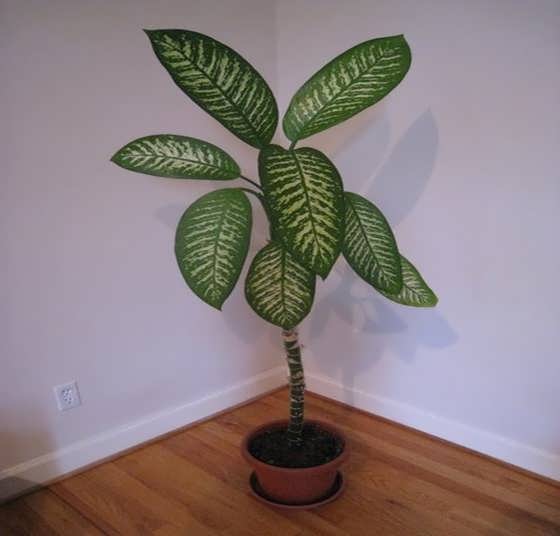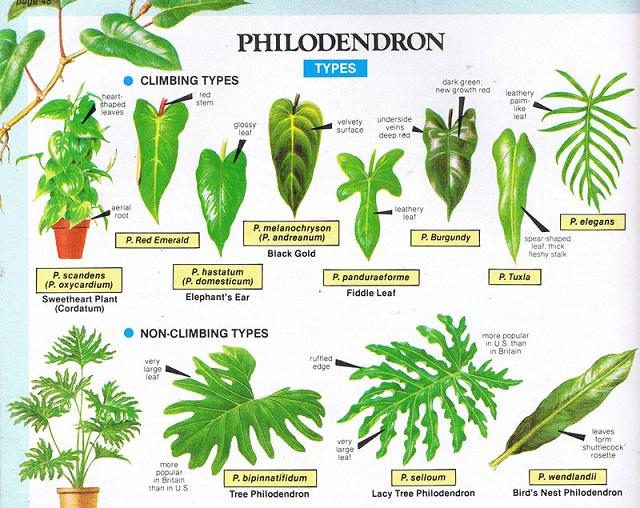My husband and I recently went to Home Depot and on a whim bought what we feel is a very lovely  plant for our dining room and kitchen area. It wasn’t until we revisited the name card looking for exactly how much light exposure the plant needed that we found the name of this particular species was Dumb Cane. We had never heard of this plant before but of course my mother took one glance at it and said, “Oh my, you bought a Dieffenbachia—better watch your dog!” According to the Pet Poison Helpline website the family of Dieffenbachia or Dumb Cane contains “insoluble crystals of calcium oxalate called raphites. Chewing or biting into the plant releases the crystals which penetrate tissue resulting in injury. When dogs or cats ingest insoluble calcium oxalate-containing plants, clinical signs may be seen immediately and include pawing at face (secondary to oral pain), drooling, foaming, and vomiting. Moderate to severe swelling of the lips, tongue, oral cavity, and upper airway may also be seen, making it difficult to breathe or swallow.”
plant for our dining room and kitchen area. It wasn’t until we revisited the name card looking for exactly how much light exposure the plant needed that we found the name of this particular species was Dumb Cane. We had never heard of this plant before but of course my mother took one glance at it and said, “Oh my, you bought a Dieffenbachia—better watch your dog!” According to the Pet Poison Helpline website the family of Dieffenbachia or Dumb Cane contains “insoluble crystals of calcium oxalate called raphites. Chewing or biting into the plant releases the crystals which penetrate tissue resulting in injury. When dogs or cats ingest insoluble calcium oxalate-containing plants, clinical signs may be seen immediately and include pawing at face (secondary to oral pain), drooling, foaming, and vomiting. Moderate to severe swelling of the lips, tongue, oral cavity, and upper airway may also be seen, making it difficult to breathe or swallow.”
 We can’t possibly be the only couple who are ignorant as to which indoor and outdoor plants are toxic to our pets. The Humane Society has an extensive list of plants that may be potentially harmful to pets including Lilies, Iris, and Philodendrons. Keep in mind the type of plant, which part is ingested, and the total amount consumed are all factors in determining how sick your pet may become.
We can’t possibly be the only couple who are ignorant as to which indoor and outdoor plants are toxic to our pets. The Humane Society has an extensive list of plants that may be potentially harmful to pets including Lilies, Iris, and Philodendrons. Keep in mind the type of plant, which part is ingested, and the total amount consumed are all factors in determining how sick your pet may become.
Spring is on the horizon and many of us are aching to get outside and put our hands in the dirt. For those of you who enjoy gardening keep in mind that various outdoor plants can also cause health problems for your pet if eaten. Morning Glory (seeds) and the entire Daffodil plant can cause diarrhea and other GI distress.
After researching this post I got to thinking, my gosh, my house and yard is a ticking time bomb for my pet! But let’s be reasonable: I’m not going to get rid of the Dumb Cane, I’m going to elevate it; and I’m not going to dig up my spring flowers, I’m going to keep an eye on my dog and put cut flowers where the dog can’t reach them. When it comes to our pets, pragmatism and awareness is needed with the understanding that we can’t possibly keep our eye on their every move.
Next week we’ll delve into why various fertilizers are toxic to our pets.
Recent Posts
About Us
Ann Arbor Animal Hospital is a locally-owned animal hospital operating for over 90 years in Ann Arbor, MI.
